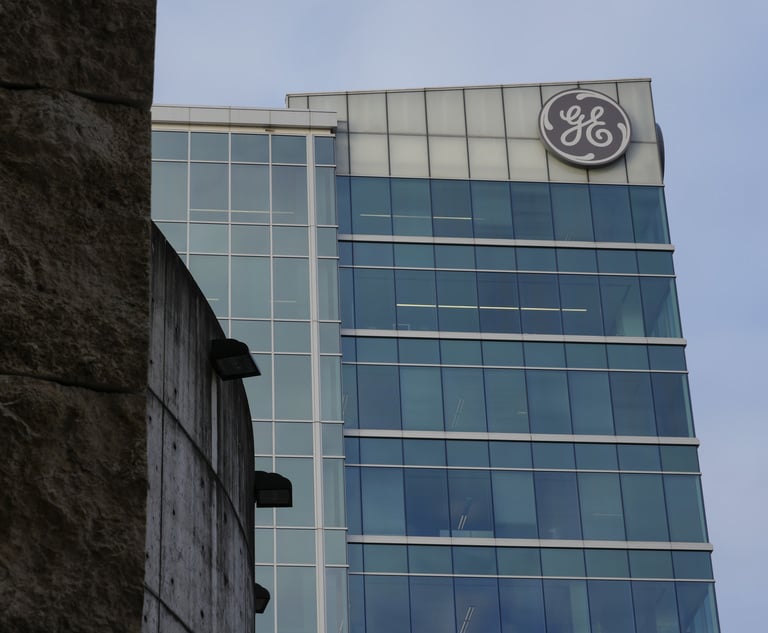Manhattan Judge Tosses Securities Fraud Suit Targeting GE Over Turbine Disclosures, Accounting Flaws
A Manhattan federal judge has dismissed an investor class action that targeted General Electric Co. for allegedly concealing a major defect with its newest line of power plant turbines and taking a "mammoth" $22 billion write-off, which sparked civil and criminal investigations of the multinational conglomerate.
May 11, 2020 at 05:15 PM
5 minute read
 A General Electric gas turbine is transported through the Port of Charleston. Photo: Shutterstock
A General Electric gas turbine is transported through the Port of Charleston. Photo: Shutterstock
A Manhattan federal judge has dismissed an investor class action that targeted General Electric Co. for allegedly concealing a major defect with its newest line of power plant turbines and taking a "mammoth" $22 billion write-off, which sparked civil and criminal investigations of the multinational conglomerate.
The May 8 ruling came as a win for GE and its Latham & Watkins attorneys, who had defended shareholder claims that the alleged missteps amounted to securities-fraud violations under the Private Securities Litigation Reform Act.
Lead plaintiff Teachers' Retirement System of Oklahoma said last year in a 111-page complaint that GE discovered an oxidation issue in 2017 that caused its turbine blades to corrode and break. At the time, GE told its customers that it planned to inspect the blades and either add a protective coating or replace the blades altogether.
But according to the complaint, GE continued to tout the reliability of its turbines for another year, before Reuters reported in December 2018 that utilities were shutting down about one-third of the company's next-generation HA turbine fleet for repairs. According to the article, GE also set aside $480 million to fix three different turbine models.
To make matters worse, that October GE had been forced to take a $22 billion goodwill stemming from its $10 billion acquisition of French manufacturing company Alstom S.A., an unprecedented move which sent GE's stock tumbling nearly 9% and led the federal government to open probes of the company.
The filing alleged that $17 billion in goodwill that GE recorded from the Alstom deal was excessive and did not account for a substantial downturn in the power-generation market at the time. GE, the lawsuit said, should have identified the discrepancies and adjusted its goodwill balance sooner, but instead continued to provide misleading valuations based on accounting that did not comply with Generally Accepted Accounting Principals.
According to the complaint, GE's market capitalization declined by about $90 billion during the alleged class period, which stretched from December 2017 to December 2018.
In both instances, the plaintiffs said, GE had knowingly made false and misleading representations to its investors in violation of the PSLRA. However, U.S. District Judge Denise L. Cote of the Southern District of New York ruled last week that none of the claims met federal pleading standards for material misrepresentations or scienter.
With regard to the turbine disclosures, Cote said that many of the statements the plaintiffs cited were too general to form the basis of a securities-fraud lawsuit. Others, she said, were either statements of opinion or "glossy statements of praise" that could not be interpreted by investors as hard assertions of fact.
Cote also noted that GE "made a number of statements" regarding the problem, and worked to implement a solution after it came to light in September 2018, a finding she said cut against plaintiffs' accusations of scienter.
"Here, the non-culpable inference offered by the defendants is decidedly more plausible," Cote wrote in the 43-page opinion.
"GE had identified the oxidation problem and what it believed to be a solution for that problem," she said. "It was rolling out replacement blades, a solution it believed would be sufficient to avert a material impact on the company's financial condition. Indeed, the SAC makes no particularized scienter allegations supporting the duty to disclose."
On the subject of GE's flawed accounting, Cote said the company's alleged recklessness did not constitute any "extreme departure" from the standards of ordinary care, and the complaint did not allege that GE's directors had benefited personally from the alleged fraud, deliberately engaged in illegal behavior or failed to check any information they had a duty to monitor.
"The assessment of goodwill was a judgment based on other judgments and projections," she said. "The failures, as described in the [complaint], were at worst failures in judgment. They do not constitute conscious recklessness."
Attorneys for Boston-headquartered GE declined to comment Monday, and a lawyer for the plaintiffs did not immediately respond to a request for comment.
GE was represented by Latham partners Sean Berkowitz, William Trach, Sarah Tomkowiak and Blake Denton and of counsel Miles Ruthberg.
The plaintiffs were represented by Laura Posner and Joel Laitman of Cohen Milstein Sellers & Toll in New York and Steven Toll, Julie Goldsmith Reiser, Molly Bowen and Eric Berelovich from the firm's Washington, D.C., office.
The case was captioned In re General Electric Securities Litigation.
READ MORE:
Lawyers See Coming Surge in White Collar Criminal, Civil Cases Stemming From Pandemic
GM's 'Mistaken' Contract Citation Did Not Admit Wrongful Death Liability, 2nd Circuit Rules
This content has been archived. It is available through our partners, LexisNexis® and Bloomberg Law.
To view this content, please continue to their sites.
Not a Lexis Subscriber?
Subscribe Now
Not a Bloomberg Law Subscriber?
Subscribe Now
NOT FOR REPRINT
© 2025 ALM Global, LLC, All Rights Reserved. Request academic re-use from www.copyright.com. All other uses, submit a request to [email protected]. For more information visit Asset & Logo Licensing.
You Might Like
View All
Oil Co. Alleges Plot to Drive Away Competition in NYC's Liquid Fuel Market
3 minute read

GE Agrees to $362.5M Deal to End Shareholder Claims Over Power, Insurance Risks
2 minute read
Lukoil Pan Americas Sues Investment Firm Over Alleged $18 Million Breach
Law Firms Mentioned
Trending Stories
- 1New York-Based Skadden Team Joins White & Case Group in Mexico City for Citigroup Demerger
- 2No Two Wildfires Alike: Lawyers Take Different Legal Strategies in California
- 3Poop-Themed Dog Toy OK as Parody, but Still Tarnished Jack Daniel’s Brand, Court Says
- 4Meet the New President of NY's Association of Trial Court Jurists
- 5Lawyers' Phones Are Ringing: What Should Employers Do If ICE Raids Their Business?
Who Got The Work
J. Brugh Lower of Gibbons has entered an appearance for industrial equipment supplier Devco Corporation in a pending trademark infringement lawsuit. The suit, accusing the defendant of selling knock-off Graco products, was filed Dec. 18 in New Jersey District Court by Rivkin Radler on behalf of Graco Inc. and Graco Minnesota. The case, assigned to U.S. District Judge Zahid N. Quraishi, is 3:24-cv-11294, Graco Inc. et al v. Devco Corporation.
Who Got The Work
Rebecca Maller-Stein and Kent A. Yalowitz of Arnold & Porter Kaye Scholer have entered their appearances for Hanaco Venture Capital and its executives, Lior Prosor and David Frankel, in a pending securities lawsuit. The action, filed on Dec. 24 in New York Southern District Court by Zell, Aron & Co. on behalf of Goldeneye Advisors, accuses the defendants of negligently and fraudulently managing the plaintiff's $1 million investment. The case, assigned to U.S. District Judge Vernon S. Broderick, is 1:24-cv-09918, Goldeneye Advisors, LLC v. Hanaco Venture Capital, Ltd. et al.
Who Got The Work
Attorneys from A&O Shearman has stepped in as defense counsel for Toronto-Dominion Bank and other defendants in a pending securities class action. The suit, filed Dec. 11 in New York Southern District Court by Bleichmar Fonti & Auld, accuses the defendants of concealing the bank's 'pervasive' deficiencies in regards to its compliance with the Bank Secrecy Act and the quality of its anti-money laundering controls. The case, assigned to U.S. District Judge Arun Subramanian, is 1:24-cv-09445, Gonzalez v. The Toronto-Dominion Bank et al.
Who Got The Work
Crown Castle International, a Pennsylvania company providing shared communications infrastructure, has turned to Luke D. Wolf of Gordon Rees Scully Mansukhani to fend off a pending breach-of-contract lawsuit. The court action, filed Nov. 25 in Michigan Eastern District Court by Hooper Hathaway PC on behalf of The Town Residences LLC, accuses Crown Castle of failing to transfer approximately $30,000 in utility payments from T-Mobile in breach of a roof-top lease and assignment agreement. The case, assigned to U.S. District Judge Susan K. Declercq, is 2:24-cv-13131, The Town Residences LLC v. T-Mobile US, Inc. et al.
Who Got The Work
Wilfred P. Coronato and Daniel M. Schwartz of McCarter & English have stepped in as defense counsel to Electrolux Home Products Inc. in a pending product liability lawsuit. The court action, filed Nov. 26 in New York Eastern District Court by Poulos Lopiccolo PC and Nagel Rice LLP on behalf of David Stern, alleges that the defendant's refrigerators’ drawers and shelving repeatedly break and fall apart within months after purchase. The case, assigned to U.S. District Judge Joan M. Azrack, is 2:24-cv-08204, Stern v. Electrolux Home Products, Inc.
Featured Firms
Law Offices of Gary Martin Hays & Associates, P.C.
(470) 294-1674
Law Offices of Mark E. Salomone
(857) 444-6468
Smith & Hassler
(713) 739-1250






